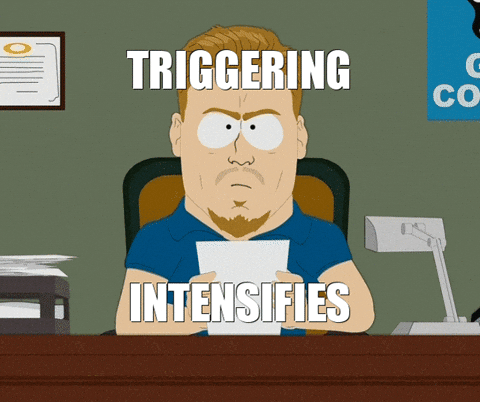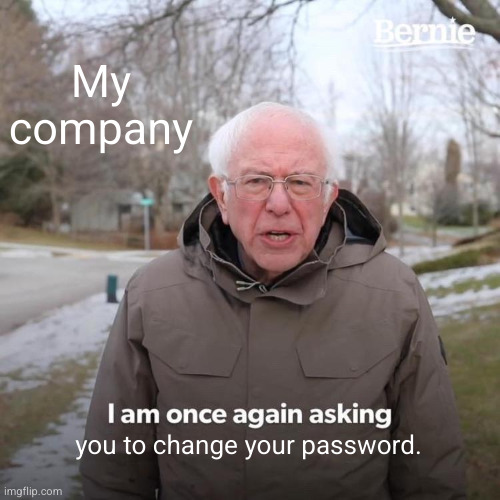Yeah, but I'm more used to them saying "occasional overtime" when they mean "5-10 hours mandatory overtime, unless it's actually busy, because we refuse to hire enough people to fill all the open positions." Because there's nothing smarter than giving all your sales staff enormous bonuses while the grunts on the floor are over 6 months behind for lack of adequate staffing.
Cybersecurity - Memes
Only the hottest memes in Cybersecurity
TOTP and KeePassXC is a blessing
I wish every system ever supported TOTP
!=bfVzh5k&nbsA|+|ZuFc=k25D5zUQ*34QDjK gang
IMO, password changes were always bs. I'm a tech, and I always disagreed with it.
Longer, better passwords were always the better option. But try to convince your average worker to memorize a 15+ character password and they'll tell you where to go.
Meanwhile... https://xkcd.com/936/
Today, with MFA.... Good MFA, not the SMS bull crap... Password "leaks" or breaches, are effectively a thing of the past.
Oh, you have my password? You guessed it, or found out leaked on some list? Cool. Good luck guessing the seed for my MFA, in the time it takes me to go change my password, locking you out of my account. MFA failures should be reported to users. Often they're not.
Short story: I once had a notice from Twitter about access to my account from a foreign location. Kudos to Twitter, since they recognised the odd behavior and stopped it (this is pre-musk Twitter BTW). I logged in, changed my password using my password manager (the previous password was too simple, from before I had a password manager), then added a FIDO MFA to my account. I tweeted out to whomever was trying to log in to my account, to thank them, as my Twitter account now had better login security than my bank. IDK why banks don't support MFA beyond sms, but that was the case at the time, and largely, that's still the case where I am.
From a security standpoint, I recommend you follow xkcd's example, generate a long passphrase for yourself, and use it to secure a password manager (and whatever recovery options they have, eg, email), and add MFA to that, and anything else that supports it.
It's a pain to do, but honestly, better than waiting to see if someone is going to be able to log in to your stuff when your password is inevitably leaked by someone.
My company changed the policy to increase the time between password changes. To compensate, they increased the required password length.
Neither of these policy changes were communicated to the employees. The expiry time tells you when it arrives (don't tell me you change it before it expires, good for you if you do), but if your new password doesn't meet the policy requirements it doesn't tell you what they are. The support request response indicated the minimum length was three letters longer. The only good thing about this ordeal is that I get paid by the hour.
This 90 days password change BS, is the worst security risk there is. Do you know how many people have Summer2024 as their work computer password because of this system? too damn many! Not to mention the problem it creates for older folks who have a hard time with the change and most times end up locking them selves out. It creates far more chaos than anything secure, which I have been explaining to my company and they still enforce it for their clients.
I am 100% adapting this scheme for my work password! Thank you!
Summer2024 is their password? Jeez. What a idiot.
Mine is a proper set of lowercase and uppercase characters, numbers, and symbols, written in a post-it note and taped to my laptop.
Ah I just keep mine in my desk drawer next to the 2FA code fob

It's often due to the security department following outdated standards. Nowadays NIST recommends the following:
Verifiers SHOULD NOT impose other composition rules (e.g., requiring mixtures of different character types or prohibiting consecutively repeated characters) for memorized secrets. Verifiers SHOULD NOT require memorized secrets to be changed arbitrarily (e.g., periodically). However, verifiers SHALL force a change if there is evidence of compromise of the authenticator.
Source: https://pages.nist.gov/800-63-3/sp800-63b.html
That said, the company I work for violates all of the above rules ...
My company's HR system (like, time off, time clock, etc.) asks for a new password every 3 months, but it doesn't give any fucks at all if you just reuse the current password apparently. I've been "changing" it to the same thing for like a year now.
I prefer that.
I've changed my password 11 times since I worked at this job.
How do I know that? Because my solution has been password+1.
Which is often a lot more secure than requiring you to create a new password. Requiring a new password frequently leads to people making memorable passwords which are a lot less secure than a good password which is kept for years.
A few years back, my company suffered a big cyber attack where the attack vector was the credentials of a high level user who frequently changed their password to the year and month for next password change, i.e. "2018october". Apparently this was common enough that the attackers were able to brute force/guess it.
Every three months, man. Gets old real fast.
Every month is 3x worse.
Any source about why changing a password regularly is not recommended?
The most prominent source is NIST, which states:
Verifiers SHOULD NOT require memorized secrets to be changed arbitrarily (e.g., periodically). However, verifiers SHALL force a change if there is evidence of compromise of the authenticator. (source)
I found an explanation on a different site:
It’s difficult enough to remember one good password a year. And since users often have numerous passwords to remember already, they often resort to changing their passwords in predictable patterns, such as adding a single character to the end of their last password or replacing a letter with a symbol that looks like it (such as $ instead of S).
NIST seems to have it as a guideline for memorised secrets:
Verifiers SHOULD NOT impose other composition rules (e.g., requiring mixtures of different character types or prohibiting consecutively repeated characters) for memorized secrets. Verifiers SHOULD NOT require memorized secrets to be changed arbitrarily (e.g., periodically). However, verifiers SHALL force a change if there is evidence of compromise of the authenticator.
It's even better when the company saves your old passwords, just so you can't use them again.
Just add a number suffix and increment it each time. This doesn't exactly make your password any stronger but that's not what they're asking for with their stupid policy.
My company tracks the first and last character so you can't do that. Personally I change a single character in the middle of my password to work around this.
Error: Your password's Levenshtein distance indicates that your new password is more than 20% similar to a password previously used within the last 10 years.
Policy requires your password to:
- Be unique
- Have at least one uppercase letter
- Have at least one lowercase letter
- Contain 2 symbols other than apostrophe
- Have 4 numbers that are either separated by other characters, or represent an integer both greater than 3000 and not ending with the same last two digits as the previous or next 17 years from the current date.
- Include exactly one Cryllic character
- Exceed no more than 18 characters
/satire (I hope)
Same. Its so stupid. Doesn't increase security and just annoys everyone.
We have three month password expiry policy on AD accounts, but the requirements aren't extreme. We'd do away with it, but then we have our own CEO writing their password down on a piece of paper and giving it to us to troubleshoot their laptop (we have admin accounts for a reason ffs), after being repeatedly told not to, forcing employees to rotate their passwords suddenly doesn't sound too crazy. People are just way too irresponsible sometimes. Plus, we need to have it for certifications, so there's that.
The CEO at my last place used to forget his passwords at least once a week, would write them on Post-It notes on his desk (and lose them by day's end).
We had a dashboard that showed failed security and he was many, many times worse than the rest of the business combined. That man cost the business more in IT time than anyone.
This was a bank. Granted, a small lending-only bank but still, I would never get a mortgage or loan with these people.
They should have just put a Yubikey on his keys. He never lost those.
It's somehow always the guys in management/on top. On the first sign of inconvenience, they start complaining about all the security measures, because now it affects them personally, and they're not here to be managed! Security is for everyone else, but definitely not them. They're above it.
Which certifications? NIST standards don't recommend regular rotations anymore.
Nist guidelines used to recommend rotation, and our security team would quickly point to it when people complained.
So of course we jumped on that and security team said "well nist are just guidelines and we go for more stringent requirements"...
